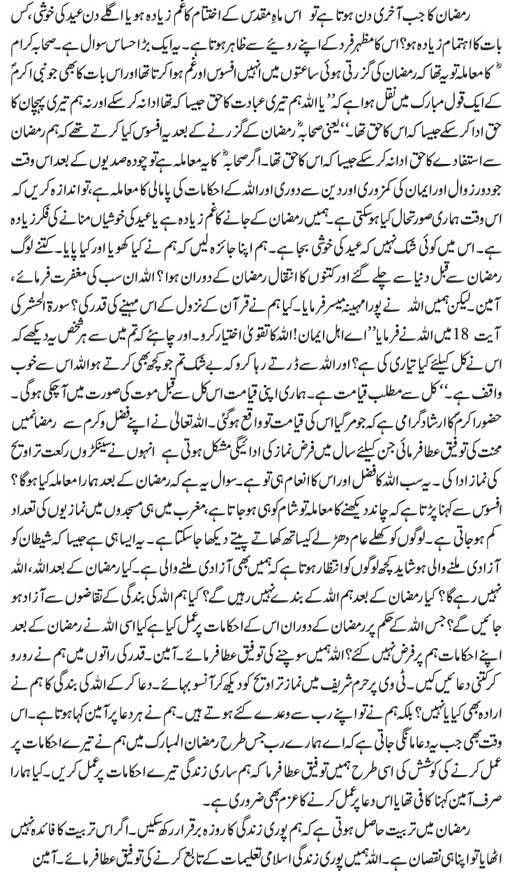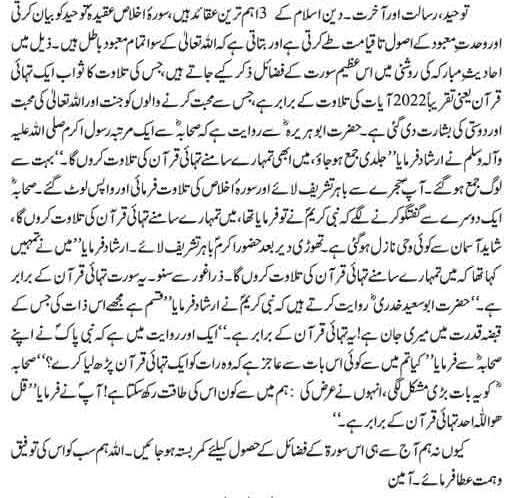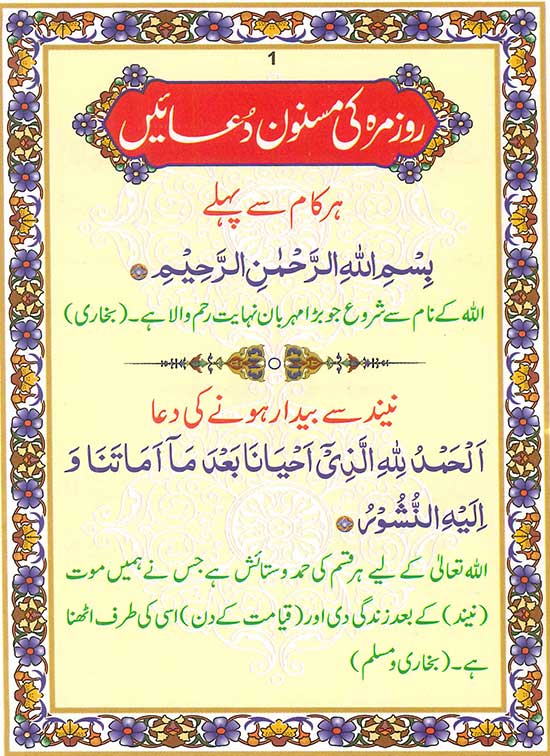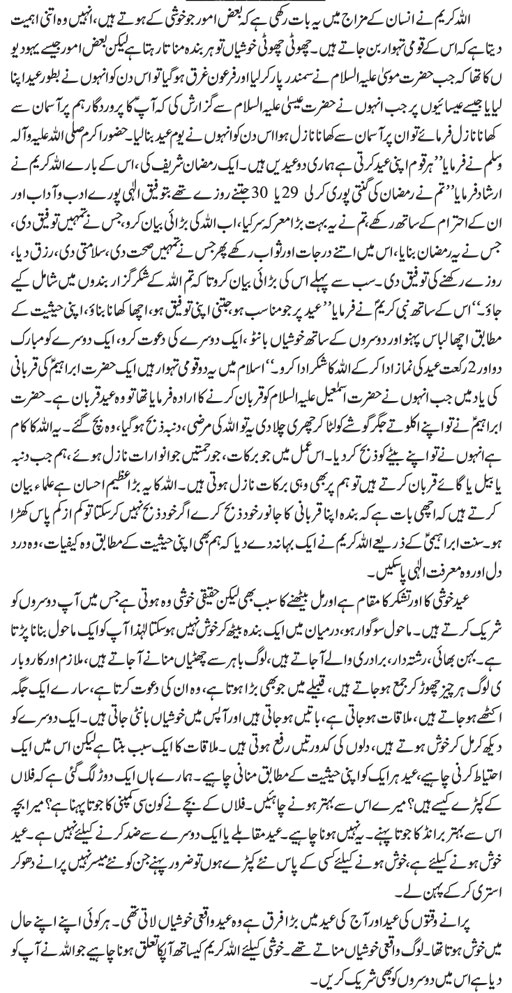
What To Do On Eid Day
1. It is Sunnah to dress in the best clothes on Eid. It was narrated that Ibn Umar used to do that along with other Companions of the Prophet [pbuh] . [Fath al-Baaree]
2. It is a must (Waajib) to pray Eid Prayer. The Prophet [pbuh] and his Companions never ceased doing it, and they even gathered the people for it including women who were having their menses, children and the elderly. [Bukhari and Muslim]
3. It is Sunnah to say Takbeer loudly when leaving our homes to go to Eid Prayer. The Prophet [pbuh] used to say this until he finished the Prayer. [Silsilat Al-ahadeeth As-Sahiha]
4. The Sunnah for Eid Prayers is to pray in the Musallah (that is in an uncovered place) and not in the Masjid. The Prophet [pbuh] never prayed Eid Prayer in the Masjid. Abu Sa’eed reported: “The Prophet used to go on the day of Eid -al-Fitr and Eid-al-Adhaa to the Musallah, and the first thing he did was to pray.” [Bukhaari and Muslim]
5. Neither Adhaan nor Iqaamah are pronounced for Eid Prayer. [Muslim]
6. Ibn Abbaas reported: “The Prophet [pbuh] prayed two Rakaahs for the Eid prayer and did not pray before it or after it.” [Bukhaari]
7. Jabir reported: “The Prophet [pbuh] used to come back from Eid-al-Fitr on a path other than the one used in going to it.” [Bukhaari]
8. It is permitted to listen to songs (without musical instruments) on Eid day especially for children. [Bukhaari and Muslim]
What NOT to do on Eid Day
1. To shave the beards especially for Eid. The Prophet [pbuh] has ordered us not to shave our beards; so it is a shame that, on this great day of demonstrating our differences in ceremonies to those of the Mushriks, that some Muslim shaves his beard so that he looks “clean” like the Mushriks.
2. To imitate the Mushriks in their practices and dress, and to shake hands with women. The Prophet [pbuh] said: “It is better that a man is hit with needle on his head than to touch a woman who is not lawful for him.” [Silsilat al-Ahadeeth as-Sahiha]
3. To listen to music on Eid. The Prophet [pbuh] said: “There will be some in my nation who will regard adultery, men dressing in silk, drinking intoxicants (al-Khamr), and musical instruments to be lawful.” [Bukhaari, Abu Dawood and Bayhaqee]
4. For women not to wear Hijaab. To do so is to celebrate Eid while committing a major sin.
5. To visit the graveyard especially on Eid. It is permitted to visit the graveyard all year long so we should not make a special case out of it on Eid.
6. To waste money and being extravagant with food instead of giving them to the poor.
Eid Ka Maqsad
What Should One Do On EID Day
Our beloved Prophet say “The person who say Subhan-Allah-e-wa-bai Hamdehe 300 times on Eid day & conveying reward of this virtuous deed to all Muslims who have been died, then Allah will gave one thousand lights (Anwaar) in the grave of every Muslims and after death the person who say will also revive one thousand lights (Anwaar)”. (Mukashifat-alquloob by Imaam Ghazali)
EID MUBARAK
Anas (RA), a companion of prophet Muhammad (peace be upon him) reported that when the Prophet Muhammad (PBUH) migrated from Makkah to Madinah, the people of Madinah used to have two festivals. On those two days they had carnivals and festivity. Prophet Muhammad (PBUH) asked the Ansaar (the Muslims of Madinah) about it. They replied that before Islam they used to have carnivals on those two joyous days. The Prophet Muhammad (PBUH) told them: ‘Instead of those two days, Allah has appointed two other days which are better, the days of Eid-al-Fitr and Eid-al-Adha.’ (Hadith)
EID-UL-FITR is celebrated on the first day of Shaw’waal, at the completion of Ramadan. Shaw’waal is the 10th month of the Islamic calendar. The Eid-al-Fitr is a very joyous day; it is a true Thanksgiving Day for the believing men and women. On this day Muslims show their real joy for the health, strength and the opportunities of life, which Allah has given to them to fulfill their obligation of fasting and other good deeds during the blessed month of Ramadan.
Sunnah of Eid
- Wake up early.
- Prepare for personal cleanliness, take care of details of clothing, etc.
- Take a Ghusl (bath) after Fajr.
- Brush your teeth.
- Dress up, putting on best clothes available, whether new or cleaned old ones.
- Use perfume (men only).
- Have breakfast on Eid-al-Fitr before leaving for prayer ground. On Eid-al-Adha, eat breakfast after
Salaat or after sacrifice if you are doing a sacrifice. - Pay Zakaat-al-Fitr before Salaat-al-Eid (on Eid-al-Fitr).
- Go to prayer ground early.
- Offer Salaat-al-Eid in congregation in an open place except when whether is not permitting like rain, snow,
etc. - Use two separate route to and from the prayer ground.
- Recite the following Takbir on the way to Salaat and until the beginning of Salaat-al-Eid:
Allaho-Akber, Allaho-Akber. La ila-ha ill-lal-lah. Allaho-Akber, Allaho-Akber. Wa-lilahill hamd.(Allah is great, Allah is great. There is no god but Allah. Allah is great, Allah is great. And all praises
are for Allah).
How to offer Eid prayer:
Ibn Abbass (RA) reported: ” I participated in the Eid-ul-Fitr prayer with the Messenger of Allah (saw), Abu Bakr (RA), Umar (RA) and Uthman (RA), and all of them held Eid prayer before Khutbah, and then the
Prophet Muhammad (saw) delivered the Khutbah (sermon).” ( Muslim )
Who should go to the prayer ground & offer Eid Prayer:
Umm Atiyah (RA) reported: “The Messenger of Allah (saw) commanded us to bring out on Eid-al-Fitr and
Eid-al-Adha, young women, hijab-observing adult women and the menstruating women. The menstruating women stayed out of actual Salaat but participated in good deeds and Duaa (supplication). I (Umm Atiyah) said to the Holy Prophet (saw): Oh! Messenger of Allah, one does not have an outer garment. He replied: Let her sister cover her with her garment.” ( Muslim )
On the Eid day, every believing man, woman and child must go to the prayer ground and participate in this
joyous occasion.
Structure of Eid prayer:
Eid prayer is wajib (strongly recommended, just short of obligatory). It consists of two Rakaat (units) with
six additional Takbirs. It must be offered in congregation. The prayer is followed by the Khutbah.
(Note from Maqsud: Eid prayer is sunnah according to other Fiqahs, only Hanafi consider it as wajib)
The Khutbah is part of the worship and listening to it is Sunnah. During the Khutbah, the Imam must remind
the community about its responsibilities and obligations towards Allah, fellow Muslims and the fellow human beings. The Imam must encourage the Muslims to do good and ward off evil. The Muslim community must also be directed to the state of the community and the Ummah at large and the feelings of sacrifice and Jihaad should be aroused in the community. At the conclusion of the prayer the Muslims should convey greetings to each other, give reasonable gifts to the youngsters and visit each other at their homes. Muslims should also take this opportunity to invite their non-Muslims neighbors, co-workers, classmates and business acquaintances to Eid festivities to expose them to Islam and Muslim culture.
Shirk Gunah-e-Azeem

Laylatul Qadr
Ubaadah bin Saamit (Radhiallaho anho) reports that he asked the Prophet (Sallallaho alaihe wasallam) about “Laylatul Qadr”. He replied: “It is in Ramadhan, during the last ten days, on the unevenly numbered nights, either the 21st 23rd, 25th, 27th, 29th. Whosoever stands in “Ibaadah” on this night, with sincere faith and with genuine hopes of gaining reward, his previous sins will be forgiven. Among the signs of this night is that it is a serene, quiet, shining night, neither hot, nor cold but temperate as if a moon is shining clear, and no meteors are shot at the “Shayateen” on that night; it lasts until the break of the dawn. Another sign is that at morn, the Sun rises without any radiant beams of light, appearing rather like the moon in it’s fullness. On that day, Allah prohibits the “Shayateen” from rising up with the Sun.”
COMMENTARY
Part of what has been mentioned in this Hadith has already been dealt with. Some signs are here mentioned about the actual night. These signs are clear and need no further elucidation. Apart from these, there are other signs too, as mentioned in the Ahadith or in the experiences of those who had the good fortune to experience “Laylatul Qadr.” The sign that is, however; most specific in the Hadith is the rising of the sun, ‘without any radiant beams of light.’ Other signs are not always there. One Sahaabi, Ab’da bin Abi Lubaaba (Radhi Allaho anho) says: “On the evening of the 27th , I tasted the water of the sea and it was sweet.” Ayub bin Khalid said: ‘I once had to bathe myself with sea water, and on tasting it, found, it sweet. This was on the 23rd night.” Some of the “Mashaaikh” (religious divines) wrote that, on the evening of “Laylatul Qadr”, everything prostrates itself before Allah, so much so that trees fall flat on the ground, then return to their normal position; these are however spiritual phenomena not visible to the ordinary person.
Aaisha (RadhiAllaho anha) reports: “I said: ‘O Messenger of Allah (Sallallaho alaihe wasallam), should I find myself the “Laylatul Qadr”, hat shall I pray. The Prophet (Sallallaho alaihe wasallam) replied: say, Allaahumma innaka afuwwun tohibbu al’afwa fa’fu anna “O Allah, Thou art the One who grants pardon for sins. Thou lovest to pardon, so O pardon me.”
COMMENTARY
This is indeed such an all-inclusive prayer, wherein one begs that Allah in His infinite Grace should forgive his sins. If that has been obtained, the path to the Hereafter is secure. What more would one require? Imaam Sufyaan Thowry used to say that to keep oneself busy on this night with ‘Duaa’ (invocations to Allah) is better than any other form of worship (Ibaadah). Ibne Rajab says that one should not only remain busy with ‘Duaa’, but should also take part in all other form of ‘Ibaadah’, e.g. recitation of the Holy Qur’an, ‘Salaat’, contemplation, etc. This latter opinion is most correct and nearer to what Rasulullah (Sallallaho alaihe wasallam) had said, as already mentioned in the previous Ahaadith.
Surah Ikhlas Kay Fazail

Taqwa
Taqwa is the central concept running through the Quran. It is translated normally as piety, heading or God fearing. In fact, Taqwa combines piety, heading, God fearing and God consciousness.
1.God Fearing in Context of ISLAM
Here fear should not be understands as scare, which can be without any love or respect. But in Islamic context fear means.
- Fear of the punishment of ALLAH on the day of Judgement.
- Fear of the losing the blessings of ALLAH in our worldly life.
- To be afraid of displeasing ALLAH –the one who is most worthy of Love.
2. God consciousness as the element of Taqwa
The person who has Taqwa is one who is most conscious about the things that displease the God.
God consciousness is the core of the quality Taqwa. God consciousness is the quality of being conscious of the presence of Allah at all times. The most God conscious person is one who is most pious. Islam therefore encourages Muslims to be pious in every aspect of Life
3. Love of ALLAH in context of Islam
- Love if ALLAH refers to man’s necessary dependence on ALLAH —the realization that he is not sufficient.
- True love of God is manifested in pure acts of worship.
- Muslim is required to manifest this love by Following God’s Path and, if necessary, sacrificing some personal desires, property, time, if require his life for the sake of ALLAH.
According to a hadith of Prophet (PBUH), If a person love God and His Messenger more than he loves anything else he will have the sweet taste of faith in his heart. In addition God will reciprocate his love Sura 3 Verse 31: Say if you do Love ALLAH follow me, Allah will love you and forgive your sins. For ALLAH is oft forgiving and most merciful.
4. Specific acts that nourish ALLAH’S love
- Have Taqwa
- Constantly repent to ALLAH
- Engage in self purification
- Do good
- Place Trust in ALLAH
- Be steadfast
- Act with justice
5. Actions that keep away Man from Allah’s Love
- Aggression
- Corruption and mischief
- Ungratefulness
- Rejection of faith
- Oppression
- Betrayal
- Waste
- Arrogance
Sura 4. Verse 36: ALLAH love not the arrogant, the vainglorious
6. Benefits that derive from having Taqwa
Taqwa assists a man in his journey in the hereafter through this life to successful conclusion.
- He will be receptive of to Guidance
- He will have proper vision, Knowledge and wisdom.
- His affairs will be easier
- He will receive forgiveness for his sins.
- He will receive mercy from ALLAH.
- He will achieve ultimate victory and bliss in this life and in the Hereafter.
Sura Anfal Verse 29 “O you who believe; if you fear ALLAH, He will grant you a criterion, remove (all) evil deeds and forgive you for ALLAH is the lord of grace unbound.”
It Is Recommended To Wait And Not Eat Food While It Is Still Very Hot
It is related from Asmaa Bint Abu Bakr (ra) that when she would prepare a broth, she would cover it for some time until it would stop boiling (or until it would no longer be extremely hot). After related this practice, she said, Verily, I heard the Messenger of Allah (saas) say,
Verily doing so allows for a greater degree of Barakah (blessings.) 1
Abu Hurairah (ra) said, Food should not be eaten until its steam goes away.2 In Zaad Al-Maaad, Ibn Al-Qayyim said that the Prophet (saas) would not eat food while it was intensely hot. And again, Barakah in this context means safety from harm as a result of eating, the nourishment provided by the food, and strength achieved for obeying Allah (swt)
1) Ad-Daarimee related it (2047), and Al-Albaanee included it in his Silsilatus-Saheehah (392). Ahmed related it as well (26418)
2) When grading this Hadeeth in Irwaa Al-Ghaleel, Al-Albaanee said, Saheeh, and Al-Baihaqee related it (7/2580)
Rozmara Ki Masnoon Duain




